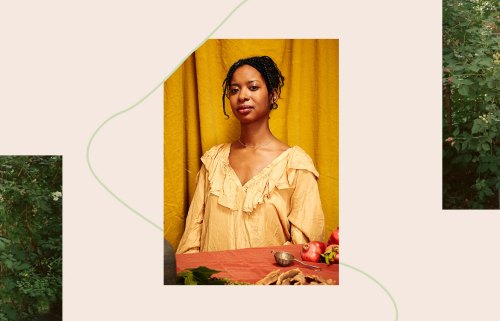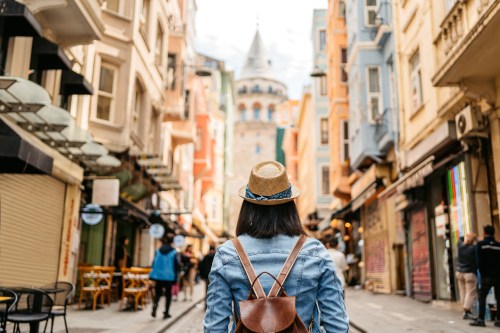Growing up around a surplus of farmland is one of the many reasons why Jess Turner always felt called to the pathway of herbalism. Her childhood was filled with gathering flowers, tracing tiny streams by her grandparents’ home in Maryland, and starting her own vegetable garden in her backyard. “Those experiences stayed with me, even during times when my life took me very far away from them,” she says.
Experts in This Article
Jess Turner is an herbalist, farmer, gardener, and educator. She’s also the founder of Olamina Botanicals.
Turner’s direct connection with nature faded in early adulthood, as she struggled with stress and anxiety during college and her early career as an organizer. It took working with an herbalist to help her rebuild a healing relationship with plants—and realize that there was, as she puts it, “a better way” to change the world without burning herself out.
In 2014, Turner quit her job, moved to Hawaii, and trained on an organic farm to become an herbalist. “From my first full day on the farm, I knew I’d made the right decision,” she says. “I had found my way back home to myself. My ancestors were pleased and I knew it.” Six years later, Turner is the founder of Olamina Botanicals, an online apothecary that sells tinctures, teas, syrups, and salves made from local herbs in the New York City area. Turner also offers one-on-one herbal consultations and leads educational workshops. Her goal is to help low-income BIPOC communities gain autonomy through what she calls “land-based” practices—work that has never been more vital than in 2020.
Turner recently spoke with Well + Good about her mission, why herbalism and urban farming are forms of Black resistance, and more.
W+G: Why do you think it’s important to educate marginalized communities in herbalism?
Jess Turner: I see myself not so much as educating marginalized people, as sharing what I have come to know with those who are shut-out of the mainstream medical system… I’m Black American, my ancestors were enslaved on Turtle Island [Editor’s note: Turner uses an Indigenous term referring to what is also known as the United States] and my family is working class. When I was a kid, my grandmother had a simple medical procedure go horribly wrong. She almost died because of a misjudgment on the part of the hospital’s anesthesiologist.
I was young, but I remember my dad having a very real conversation with me, in which he shared that the care my grandmother had received was substandard because we were Black. This made a deep impression on me. Western medicine was built upon the exploitation, mutilation, and experimentation of Black bodies…We are also operating in a for-profit health-care system in which care is doled out based on class, race, and gender privilege. Not to mention the pharmaceutical industry’s long practice of raiding Indigenous communities for their sacred plants [and] making a profit when these botanicals are turned into pharmaceuticals, without any benefit to the people from which the knowledge came.
As Black folk, as marginalized people, as people on the front line of the battle against climate change, learning to care for oneself and for loved ones through plants and through the land—through means the Earth has abundantly shared with us—enables us to develop autonomy from systems that have never had our best interest in mind.
W+G: What exactly are land-based healing practices and how does that tie in with what you do?
JT: “Land-based healing practices” is a term I started using as a catch-all for the many ways that Black folk can consciously build a connection with the Earth, with plants, with fire, water, air, the sun, and moon. I talk about Black people because I am Black, and I root my practice in Black liberation struggle, but I think that all people who are oppressed by what bell hooks calls the “imperialist white supremacist capitalist patriarchy,” and have had their medicine stolen from them can utilize similar frameworks.
I could point to studies that show that time in nature helps to reduce stress, lower blood pressure, and has positive impacts across a range of health issues. In our hearts, in our spirits, we know that connecting to that which creates and sustains life—the Earth itself—is restorative and nourishing. We know that doing so helps us feel joy.
My work is about building connections. That can mean helping someone learn to identify the plants that grow around them that are labeled weeds—but are in fact powerful healers—and make their own herbal preparations from them. It can mean supporting someone to remember that aunt, uncle, cousin, grandparent, or other person in their life who, when they got sick, went to the cupboard to make a plant-based remedy. It can mean helping people identify the things that they have in the cupboard at home that can help them address stress.
At the same time, we owe a debt to the Earth for our being able to live at all. Were it not for all of the elements, oceans, trees, air, and tiny microbes, we could not exist. We owe a debt to the animate and inanimate world around us for our lives, yet within late capitalist modes of being, we zoom around without contemplating these connections… We live in a culture that does not acknowledge them.
There’s the bigger project of the work we need to do to decolonize and compost imperialism, capitalism, white supremacy and hetero-patriarchy—all of which are destroying the Earth—but from my way of thinking, this has got to start with a very heart-centered position of “I have gratitude to the Earth for giving me this tomato that I grew from seed.”
Land-based healing practices are also about working through trauma [Black people] ]inherited from being descended from people who were forced to work the land through the institution of chattel slavery. How do we work through it? Farming on our terms. Growing on our terms. Growing with love and reverence for the land, rather than for the express purpose to extract as much value as possible from the land.
W+G: What are barriers that make it harder for BIPOC and other marginalized communities to have access to herbal healing and farming?
JT: The institution of private property is a system in which time in the woods and access to space to grow is determined by the amount of financial resources one has, to start. Further, many of our people have had our land, language, and medicine-ways stolen from us by murderous colonial powers. The USDA’s farm loan programs have been documented to discriminate against BIPOC [communities]. In the 1950s, our people were also denied crucial post-war housing loans that could have become the equity and family wealth that whites have been building for generations. Red-lining [the practice of denying business and housing loans to people of color] means our neighborhood home values are fractions of those in white neighborhoods.
…African-Americans went from owning some 14 percent of U.S. farmland in 1910 to today owning less than 1 percent. We were denied critical USDA farm loans that were given to whites, driven out of the rural South by white mob violence, and forced into cities during the Great Migration for better employment opportunities.
W+G: How do you see herbalism and urban farming as forms of Black resistance?
JT: Malcolm X said: “Land is the basis of all independence. Land is the basis of freedom, justice, and equality.” Growing our own food and feeding ourselves helps us develop autonomy and self-determination. … With many Black folk living in cities under food apartheid—a condition in which it is impossible to find fresh, nourishing food near where we live—farming in cities helps us to give to ourselves what the system refuses to provide us.
Additionally, for people descended from Africans enslaved in the United States, with our ancestors having been forced to work the land, our relationship to agriculture became incredibly fraught. But as Leah Penniman [the co-director of Soul Fire Farm] says, while the land was “the scene of the crime,” it was not the land itself that harmed us. So I feel like farming helps us to reclaim our kinship with the Earth. Penniman also talks about how the Africans who slavers stole from different parts of Africa were stolen because they were master agrarians. And so I feel like farming becomes this ode to the people who are responsible for my being here.
As far as how herbalism is a form of Black resistance, practicing herbalism helps us to connect with a power source greater than any human-created institution. This source is the Earth itself. We also get to decide what happens to our loved ones, what happens to our bodies, rather than these decisions being made by the medical system. Black people live in a system hell-bent on our annihilation. Practicing herbalism and learning the healing plants is a celebration of our being. It is an act of defiance: in practicing herbalism we declare that in spite of it all we are still here, thriving, loving one another, experiencing joy and beautiful moments of connection with beings who are more-than-human.
W+G: In what ways do you think it is vital to talk about environmental racism during our current social climate?
JT: I recently listened to a Ruth Wilson Gilmore interview in which she said that abolition ought to concern itself with environmental racism, and that abolition meant environmental justice. BlPOC are more likely than whites to live in areas that are polluted, toxic, and vulnerable to the impacts of climate change. In this moment, in which we are reckoning with our collective past and present, we have to look at the many types of violence that the system of white supremacy wreaks on racialized people. Going back to Ruth Wilson Gilmore, she calls racism “the state-sanctioned or extralegal production and exploitation of group-differentiated vulnerability to premature death.” When Hurricane Katrina hit, residents of areas of New Orleans most vulnerable to flooding were Black and Vietnamese. Flint, Michigan divested from its water system to such an extent that toxic levels of lead found their way into the drinking water of this predominantly Black city. You can lay a map of the areas of New York City with the highest rates of incarceration and they are the poorest and have the highest rates of asthma. White supremacy shows up in the lived environment and in our bodies. We can’t talk about justice without talking about these things.
W+G: How can readers support the work that you’re doing within marginalized communities?
JT: When uprisings began to protest police violence against Black people this year, I started sharing my herbal preparations with Black folks in my network who were experiencing trauma. I raised a bit of money for shipping and gave the medicine away as an act of solidarity and love. Like many Black-femme-owned businesses, mine is run on a wing and a prayer. I’d love to be able to expand my work, teach more free classes, and not go broke doing so. People can support me by contributing to my reparations fund. This fund is exclusively for herbal medicine, herbal education, and healing for Black people.
Editor’s note: This interview has been edited and condensed for clarity.
Oh hi! You look like someone who loves free workouts, discounts for cult-fave wellness brands, and exclusive Well+Good content. Sign up for Well+, our online community of wellness insiders, and unlock your rewards instantly.
Sign Up for Our Daily Newsletter
Get all the latest in wellness, trends, food, fitness, beauty, and more delivered right to your inbox.
Got it, you've been added to our email list.











